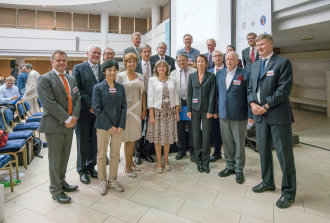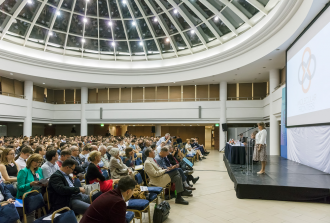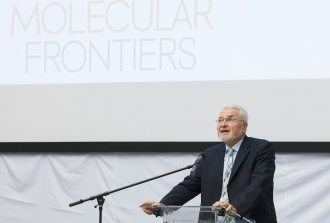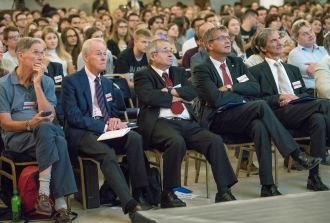After Stockholm, Gothenburg, Tokyo and Seoul the symposium came to Budapest, organised jointly by Eötvös Loránd University (ELTE), the Faculty of Sciences of the Hungarian Academy of Sciences (HAS) and the Royal Swedish Academy of Sciences with the sponsorship of the NRDI Office. This year’s topic was proteins in medicine. The topic is closely related to the MedInProt Excellence Collaboration Programme which tries to find modern solutions to the challenges of protein science and drug research.
The conference primarily addressed the younger generation. At Molecular Frontiers symposia participants aged 16 to 23 have the opportunity to meet eminent representatives of various fields of science, including Nobel Prize winners such as, in the case of the Budapest event, Kurt Wüthrich, Arieh Warshel and Tim Hunt.
In their keynote speeches at the opening ceremony Péter Szalay, Vice-rector of ELTE, László Lovász, President of the HAS, József Pálinkás, President of the NRDI Office and Lívia Sarkadi, Chair of the Hungarian Chemical Society demonstrated how molecules are viewed by physicists, mathematicians and chemists.
József Pálinkás was delighted to see the hundreds of students at the conference and expressed hope that many of them get a taste of science, become more committed to learning and research, and will understand the pleasure of solving scientific problems. Research, however, is not only a fun brain game but it is also useful – just consider how many participants can be grateful to the pharmaceutical industry which is based on chemistry. It will only take a few years to see this young generation achieve great results in molecular sciences which help understand nature by connecting several disciplines.
Bengt Nordén, former chair of the Nobel Committee for Chemistry, founder of Molecular Frontiers, recalled that he announced the foundation of this “virtual institution” precisely 11 years ago in Budapest, at the First European Chemistry Congress, together with Nobel laureate chemist Jean-Marie Lehn.
Molecular Frontiers symposia and the foundation have a dual purpose. In part they are looking for breakthrough scientific results that push the boundaries of science – as a way to identify potential candidates for the Nobel Prize. But the other purpose, as expressed by Bengt Nordén, is even more important: they want to show society, and youth in particular, that science – as József Pálinkás said – is not only interesting but also useful. For practical application, however, we need to understand how processes work.
As MedInProt senior professor András Perczel, chair of the first day of the symposium said, this year’s event was dedicated to the memory of György Oláh. The recently deceased Nobel Prize winner chemist was commemorated by György Pokol, Director of the HAS Faculty of Science, and Arieh Warshel dedicated his lecture to his memory. György Oláh, who was delighted to meet young people, often emphasised that education is an investment into the future.
|
|
||||
 |
 |








